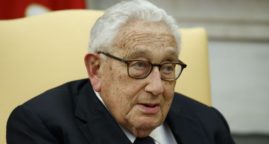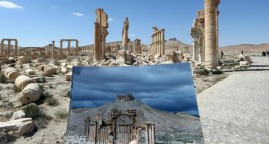Lebanon is ‘not a country of permanent asylum,’ Prime Minister tells UN Assembly
Lebanon is no longer able to assimilate additional displaced persons, and the United Nations should envision resettling the displaced Syrians within their national borders, the President of Lebanon’s Council of Ministers, Tammam Salam, told the UN General Assembly.
“We stress once again the temporary character of the Syrian presence in Lebanon, and we declare that our country is not a country of permanent asylum and that it is a final homeland for the Lebanese only,” said Mr. Salam during the Assembly’s annual debate.
He said that Lebanon hosts displaced Syrians that equal in number one third of its population, with limited domestic resources and with insufficient international assistance. Indeed, Lebanon has been disappointed at the level of international response to its needs as a host country.
The UN should set up an overall vision to resettle the displaced Syrians inside their borders and work with the concerned parties to turn this vision into a workable plan as soon as possible, he said.
On the domestic political situation, he said that Lebanon is undergoing a severe crisis due to the inability of the Parliament to elect a president for more than two and a half years. This led to a “quasi-paralysis” of the legislative authority, slowed down the work of the executive branch, and negatively affected the economy.
Noting that this year marks the 10th anniversary of UN Security Council resolution 1701 (2006), which secured a ceasefire in the Israeli-Hezbollah war, he reiterated the country’s call for the international community to compel Israel to halt its violations of the Lebanese sovereignty and withdraw from the northern part of Al Ghajar village, the Shebaa farms, and the hills of Kfarshuba.
On 30 August, the Security Council unanimously extended the mandate of the UN Interim Force in Lebanon (UNIFIL) for one year, expressing concern at the limited progress made towards a permanent ceasefire, a decade after the adoption of resolution 1701.
Originally established in 1978, UNIFIL was greatly reinforced after the 2006 fighting to oversee the cessation of hostilities between the two sides. It is tasked with ensuring that the area between the so-called ‘Blue Line’ – separating Israel and Lebanon – and the Litani River is free of unauthorized weapons, personnel and assets. It also cooperates with the Lebanese Armed Forces so they can fulfil their security responsibilities.
Read the article on the UN website
Related Articles
The Coming Crime Wars
09/21/2018. Future conflicts will mostly be waged by drug cartels, mafia groups, gangs, and terrorists. It is time to rethink our rules of engagement.
The Coronavirus Pandemic Will Forever Alter the World Order
04/03/2020. The U.S. must protect its citizens from disease while starting the urgent work of planning for a new epoch.
Conference on Safeguarding Endangered Cultural Heritage
12/03/2016. That visit provided an opportunity to begin the reconstruction and restoration process of the Timbuktu mausoleums, but also to begin international discussions.






